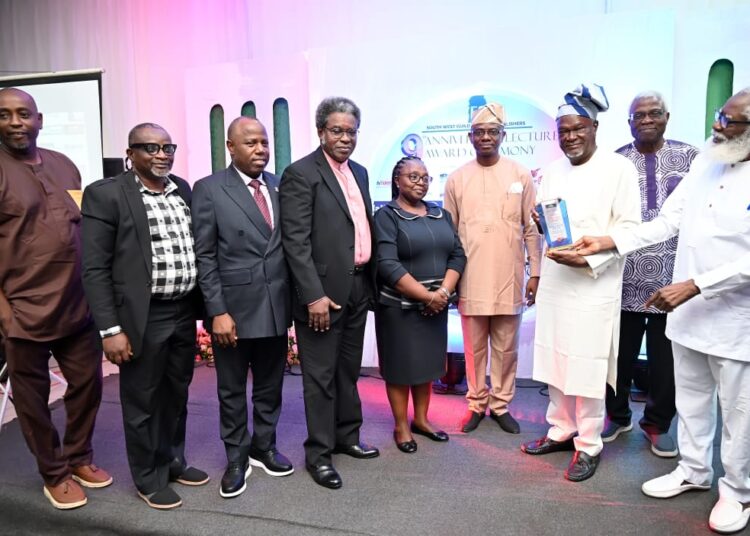As Nigeria faces mounting concerns over governance and eroding public trust, thought leaders, journalists, and policymakers convened in Ibadan for the 9th Anniversary Lecture of the South West Guild of Online Publishers (SWEGOP), where critical reflections on the state of the nation and its democratic future dominated the discourse.
Held at the International Conference Centre, University of Ibadan, the event provided a high-level forum to dissect Nigeria’s political reality and explore viable solutions ahead of the 2027 general elections.
Delivering the keynote address on behalf of the guest lecturer, Prof. Laolu Akande, Mr. Idowu Johnson painted a grim picture of Nigeria’s governance trajectory. He argued that the nation’s challenges are rooted in its very structure.
“We must understand the nature and character of the Nigerian state. It has been captured by the bourgeoisie class, making genuine governance, legitimacy, and leadership very difficult to achieve,” he said.
Citing six decades of consistent governance decline, Johnson lamented that citizens have become increasingly disillusioned. “There’s a serious deficit of trust in leadership. Expectations are perpetually unmet. People no longer believe in the system,” he added.
According to him, good governance is more than a buzzword, it entails participatory, transparent, efficient, and accountable government. However, he stressed that, “There can be no good governance without effective political leaders.”
Johnson also emphasized the worsening economic and social conditions of the average Nigerian. Comparing the present with the 1960s and 70s, he noted that basic needs such as food, clothing, shelter, and quality education were once accessible to low-income earners but have now become luxuries.
“In 2003, PhD school fees at the University of Ibadan were ₦19,000. Today, they range between ₦270,000 and ₦300,000, while the salary of an assistant lecturer has hardly increased. How can the children of the poor afford this?”
He added that Nigeria’s once-functional primary healthcare system is now in shambles, while roads and infrastructure continue to decay, contributing to insecurity. “When people lack basic opportunities, they resort to criminality,” he warned.
Among the major obstacles to progress, Johnson identified corruption, impunity, and electoral malpractice.
“Nobody has been punished,” he said bluntly. “Those who destroy the economy are celebrated. They manipulate the people and go scot-free.”
He criticized the influence of money in politics, pointing out that the cost of running for office has made it nearly impossible for credible candidates to compete.
In his words, “Why can’t you, as journalists, contest for governorship or presidency? Because it requires at least ₦50 billion. That’s how the political space is cornered by the rich.”
He also highlighted the abuse of law, ethno-religious manipulation, and the marginalization of women and youth in politics. “Churches are springing up everywhere but they offer no jobs, no empowerment. It’s spirituality without impact,” he said.
Looking ahead to 2027, Johnson called for urgent reforms: electronic transmission of election results, strict enforcement of anti-corruption laws, and robust civic engagement.
“The 2023 elections eroded public confidence. To rebuild that, we need transparency and political will,” he said. He further urged a reawakening of institutions like the EFCC and ICPC: “They exist in theory, but in practice, they’re very, very weak. They must start prosecuting corrupt politicians and recovering stolen wealth.”
Johnson also emphasized issue-based campaigns, citizen political education, stronger party ideologies, and the promotion of youth and women in politics. “The media must rise to the challenge, hold leaders accountable, amplify the right voices, and educate the electorate,” he urged.
Earlier in his welcome address, Pastor Bisi Oladele, Chairman of SWEGOP, comprising all the six states of the South West region, reaffirmed the Guild’s commitment to ethical journalism, public accountability, and digital innovation.
“Our mission is to transform online journalism into a force for truth and development in Southwest Nigeria. We aim to self-regulate, empower our members through training, and stand firm in defending press freedom,” he said.
Oladele explained that the lecture’s theme and guest were carefully chosen to address the “wide gap of distrust between government and citizens.” He said SWEGOP believes that by fostering informed civic engagement, the media can help bridge that divide.
Veteran broadcaster and former Nigerian Ambassador to the Philippines, Dr. Yemi Farounbi, delivered a rousing contribution that spotlighted the media’s evolving role.
“In a digital age where traditional media is constrained, online publishers are indispensable in shaping political consciousness,” he said. He urged publishers to focus on accuracy, political education, and inclusivity.
“Be watchdogs of democracy, investigate corruption, expose abuse of office, and combat fake news. Be neutral, objective, and fair,” he charged. “We must break the cycle of recycled leadership by engaging the youth where they are online.”
Dr. Farounbi also called for continuous tracking of campaign promises and a deliberate push for issue-based politics. “Counter hate speech. Promote unity. Let’s make our democracy work,” he concluded.
Mr. Awowole Brown, who represented Africa’s richest man, Alhaji Aliko Dangote, extended the Dangote Group’s felicitations to SWEGOP.
“We are proud to associate with SWEGOP as a partner in progress.” He acknowledged the resilience of the media despite economic headwinds, noting, “You do so much for society and get so little in return.”
He emphasized the group’s commitment to supporting digital journalism, despite occasional skepticism about its legitimacy. “You are not ‘internet infestations,’ as some call you. You are essential voices in a digital democracy,” he said.
As part of their immense contributions of many years to the media industry, journalism profession, and governance in Nigeria, Prince Dotun Oyelade, a veteran journalist and the Commissioner for Information and Orientation was honored with the Legendary Media Personality award.
Others who bagged awards include Dr Babatunde Olomu Olukayode, the Comptroller of Customs (Border Security Expert and Trade Facilitation Strategist), and Mogaji Wole Arisekola.

